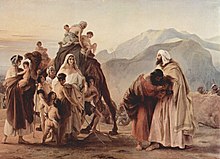The story of Moses is so familiar it is difficult to gain new insights about it. I listened to several different podcasts about the reading this week, and here are just a few of the comments that I found interesting.
Moses' Ark
When we talk about the ark we usually think about Noah's Ark. In this story an ark, or תבת, shows up again, but this time it is child sized. Just as Noah covered his ark with pitch, Jochebed covers her ark with slime and pitch to make it water proof. It is set adrift on the waters, commended to God. Like Noah's ark, this one holds the head of a new dispensation, the beginning of a new covenant era. I think the paralells are intentional. The editors are using symbols to communicate something about God's relationship to man and His role in the destiny of his chosen people. I was also touched by one of the commentators that talked about how all mothers are like Jochebed. We bring forth and nourish our children for a short while, and then send them out into an uncertain world. We hope, when we do, that we have done a good enough job creating a spiritual ark for them that will carry them safely through into their new life.
Moses' Character
Another podcaster talked about Moses' compassionate character. Moses initially got into trouble in Egypt because he was defending a Hebrew slave against an Egyptian. Later when he comes across Jethro's daughters having trouble defending their flocks at a well, he jumps in and helps there, too. Finally, when he talks with the Lord through the burning bush, he is clearly uncomfortable with the idea of returning to Egypt to free the children of Israel, but after the Lord gives him some assuances, he agrees to go. Even though he was raised in Pharaoh's palace, somewhere he learned compassion.
Some number symbols
In this story we have a lot of occurances of the symbolic numbers forty and seven. Forty is a number that represents "a lot". Seven is a number that signifies completeness. When the house of Israel comes into Egypt at the time of Joseph, there are 70 people who come, or in other words, all the house of Israel at the time. The Priest of Midian had seven daughters, a complete family. Moses dwelt in Midian for 40 years, or a long time. The House of Israel had been in bondage 400 years, a very long time.
The Women
There are not a lot of women mentioned in the Bible, so it is remarkable that women play a big part in the Moses story. First with have the two midwifes, Shiphrah and Puah, who defy Pharaoh by refusing to kill the male infants. Then there is Jochebed, Moses' mother, and Miriam, his sister, who help Moses survive and find his way to Pharaoh's daughter. Finally, there is Zipporah, Moses' wife, who saves Moses from the wrath of the Lord by circumsizing their son. All of these women played essential roles in Moses' success. Later, Miriam, Moses' sister, becomes a priestess and plays an important role in the exodus. Zipporah and Jochebed also have roles to play later. I watched a short YouTube video about the roles of women in Egyptian society. Women had more rights in Egypt than in many other contemporary civilizations. When women married in Egypt, they kept control of their dowery assets during their marriage, and if there was a divorce, the woman would take her pocessions with her when she left. Maybe the more progressive role of women in Egypt rubbed off on the Israelites. I also find it interesting that at the end of Exodus 3, it is the women who are asked to get the treasure from Egypt. They are specifically asked to ask of their masters to have gold, silver and cloths, and they would give them. It makes me think, what would have happened if the men had been given this job? How would they have handled it.






